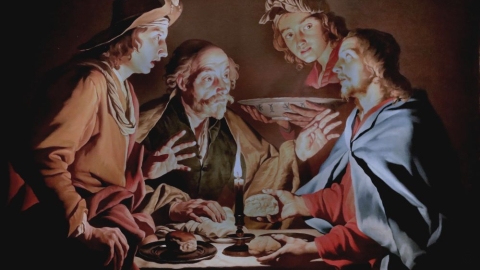United States: Rome Distances Itself from Pro-life Bishops

Archbishop Jose Horacio Gomez
The prefect of the Congregation for the Doctrine of the Faith (CDF) has intervened in the debate which divides the American episcopate, about the refusal of communion to political figures supporting laws contrary to the teaching of the Church, concerning abortion and euthanasia.
Msgr. Jose Horacio Gomez, Archbishop of Los Angeles and President of the United States Conference of Catholic Bishops (USCCB), wrote to Rome to warn the Pope that the USCCB was working to establish a common line before allowing the refusal, where appropriate, of sacramental communion to politicians encouraging abortion or euthanasia.
Cardinal Luis Ladaria Ferrer, Prefect of the Congregation for the Doctrine of the Faith, sent him a letter which may be puzzling.
For the high Roman prelate, the initiative of the USCCB amounts to presenting “abortion and euthanasia as the most demanding points of the morals and social doctrine of the Church”: an “erroneous” perspective in his eyes.
- This proposal deserves a long commentary. We must distinguish between “more demanding” and “more scandalous,” that is, leading to sin. In addition, these two faults strike the more destitute individuals: the infant in his mother’s womb, and the distraught patient who sees himself as a burden for others. This is why they are more vigorously defended by the Church.
Further on, the prefect of the CDF warns: “a uniform line of conduct (decided within the USCCB) cannot replace the authority of the diocesan bishop, the sole master in the matter.” A singular warning, given that, since Vatican II, episcopal conferences have adopted the unfortunate habit of bypassing the ordinaries of the dioceses, without Rome having anything to say about it.
What is at the heart of the Roman response is rather the risk of the scandal of an open division between American bishops: given its “possibly contentious nature,” the question of the refusal of sacramental communion could “have the opposite effect and become a source of discord rather than unity within the episcopate and the larger Church in the United States,”, in the eyes of the cardinal.
For the latter, “any statement of the Conference regarding Catholic political leaders would best be framed within the broad context of worthiness for the reception of Holy Communion on the part of all the faithful, rather than only one category of Catholics.”
- While it is understandable that the danger of a division of the American episcopate could preoccupy the Vatican, one has to wonder why. In other words, why the application of the universal discipline of the Church, enshrined in canon law, risks dividing bishops among themselves.
However, the Archbishop of Los Angeles had based his initiative on a private communication from Cardinal Joseph Ratzinger, then prefect of the CDF, to the American prelates, dating from 2004.
The one who was to become Pope Benedict XVI was categorical: “Regarding the grave sin of abortion or euthanasia, when a person’s formal cooperation becomes manifest (understood, in the case of a Catholic politician, as his consistently campaigning and voting for permissive abortion and euthanasia laws), his Pastor should meet with him, instructing him about the Church’s teaching, informing him that he is not to present himself for Holy Communion until he brings to an end the objective situation of sin.”
And Cardinal Ratzinger added: “When these precautionary measures have not had their effect or in which they were not possible, and the person in question, with obstinate persistence, still presents himself to receive the Holy Eucharist, the minister of Holy Communion must refuse to distribute it.”
It is the scope of these words which Cardinal Ladaria intends to relativize: “Cardinal Ratzinger's communication should thus be discussed only within the context of the authoritative Doctrinal Note (of 2002) which provides the teaching of the Magisterium on the theological foundation for any initiative regarding the question of worthy reception of Holy Communion.”
However, the 2002 memorandum to which the prefect of the CDF refers only gives very general principles, confining itself to recalling that “the serious obligation for those involved in legislative bodies to oppose any law that attacks human life.”
For the patron of the former Holy Office, the American bishops have more need of a “broad and serene dialogue among themselves and also with the Catholic politicians of their dioceses who do not support the fullness of the teaching of the Church in order to understand the nature of their positions.”
And if despite everything, the American bishops persisted in their initiative, Cardinal Ladaria warns: “Episcopal conferences can only publish doctrinal declarations when they are unanimously approved”; in contrast, “a majority alone is not sufficient for publication,” and ultimately requires the approval of the Vatican.
This condition sounds like a defeat for American conservative bishops. The Speaker of the House of Representatives, the very progressive Nancy Pelosi, was not mistaken. Asked by EWTN on May 13, the Democrat - baptized into the Catholic Church - said she was “satisfied” with the Roman letter. Enough said.
(Sources : Catholic News Agency/Catholic News Service – FSSPX.Actualités)
Illustration : Dreamstime / Carrienelson 1



